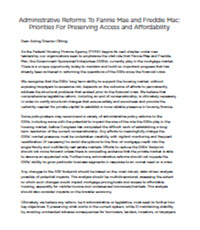The Real Estate Roundtable on Tuesday wrote to the Treasury Department and IRS about the new limitation on business interest deductibility enacted in the Tax Cuts and Jobs Act of 2017 (TCJA). The provision allows qualifying businesses to continue fully deducting interest related to commercial real estate debt. (Roundtable comment letter, Feb. 26)
 |
The Roundtable's Feb. 26 letter on business interest deductibility. |
The letter includes detailed comments on several 163(j) implementation issues and makes the following recommendations:
 |
The need to preserve the deduction for income-producing real estate was at the center of Jeffrey DeBoer's testimony and exchanges with Senate Finance Committee members before final passage of the 2017 tax overhaul law. (Roundtable Statement for the Record, Sept. 19, 2017 and video clips). |
The economic consequences of changes to the deductibility of business interest expense, and particularly the potential impact on real estate, was a central focus of lawmakers during consideration of the historic tax overhaul in 2017. The need to preserve the deduction for income-producing real estate was at the center of DeBoer's testimony and exchanges with Senate Finance Committee Chairman Orrin Hatch – and other members of the committee – during the last congressional hearing on business tax reform prior to votes on the TCJA. (Roundtable Statement for the Record, Sept. 19, 2017 and video clips).
The Real Estate Roundtable and 27 other industry organizations today submitted principles for reforming the Government-Sponsored Enterprises (GSEs) Fannie Mae and Freddie Mac, which underpin the multi-trillion-dollar financial market for single-family and multifamily mortgages. (GSE Reform Coalition letter, March 1)
 |
The Real Estate Roundtable and 27 other industry organizations today submitted principles for reforming the Government-Sponsored Enterprises (GSEs). |
 |
The coalition states that FHFA should establish certain policies to support the continuation or expansion of a robust housing market. |
Senate Banking Committee Chairman Mike Crapo (R-ID) on Feb. 1 released an outline for reforming the nation's housing finance system, including the GSEs. (Crapo Statement and Housing Reform Outline, Feb. 1 / Roundtable Weekly, Feb. 8)